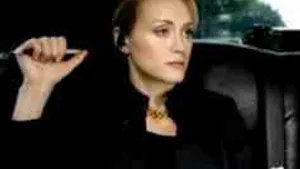Stay in the Loop
BSR publishes on a weekly schedule, with an email newsletter every Wednesday and Thursday morning. There’s no paywall, and subscribing is always free.
Definitely not a love story
'Atlas Shrugged' on film

As a single woman desultorily searching for Mister Right, I've found that my biggest date-breaker occurs when a well-meaning suitor solemnly announces as we share a plate of gelato, "My life has been changed by reading Atlas Shrugged."
To which I usually reply, "Wow! Did he really shrug? Then why are we still around? Wouldn't we be falling all over the universe?"
Ah, yes— the title is allegorical. I get it, but unfortunately Ayn Rand's followers don't and won't. Humor isn't their strong suit.
When my latest Ayn Rand acolyte date and I arrived at the Ritz at the Bourse to see Atlas Shrugged, Part 1, we found four nuns, three novices and a superior standing front of us at the ticket booth. The nuns were shortly joined by a bishop and his assistant. I know this because the bishop introduced himself to the head nun.
Matt, my security analyst date, nodded to me appropriately, as if to say, "See? I told you objectivism is a moral philosophy."
I, however, remained skeptical. In my Catholic high school, Atlas Shrugged was on the unofficial list of forbidden books. Ayn Rand was an avowed atheist and consequently, as my religious teacher used to say, an uncaring person.
Turns out the holy orders were at the Ritz to see Of Gods and Man.
This left Matt and me in the theater with two older gentlemen clutching Manila envelopes. The four of us constituted the entire audience for the Tuesday early evening show.
Creative selfishness
Rand's book is bigger than a Bible and contains more names and addresses in it than an old Donnelley Directory. So I should have been grateful that the movie is only the first installment of three parts. Yet it was still too long-winded and convoluted. It ends abruptly when oil wells go up in flames and the owner of the reserves leaves a note telling everyone, in effect, to go to hell.
According to Matt, my date, this movie lacked sincerity. How, I thought to me, can a screenplay based on a novel about "creative selfishness" be anything but cold hearted?
Matt fancies himself a doer, not a taker. He does not like donating to charity, lest he encourage the weak and spineless. So I got excited during the scene where Hank Reardon, a heroic steel executive, gives his younger brother $100,000. I thought Matt might be inspired to follow Hank's example vis a vis me. But the most I could expect after the movie was a Margarita.
Glorified speechifying
Truth to tell, even Matt was disappointed in the whole affair, even though, as far as I could tell, the film is faithful to the novel he so adores. The movie's dialogue amounted to glorified speechifying, just like Rand's writing. Every scene was tinted through a joyless colored lens, but Rand's philosophy could hardly be construed as optimistic.
All right, Philadelphia's Union Trust Steak House (the backdrop for most of the indoor scenes) looked good. But it looks even better when there's a plate of oysters on the half shell in front of you and a Delmonico waiting in the wings.
All these aspects as originally presented should have contributed to our appreciating the story. Instead, they just help accentuate the flaws of Rand's extreme libertarian philosophy, which looks even sillier on film than it reads on paper.
"'Mired in medocrity'
Despite my boredom, I remained hopeful— not that the film would improve, but that its dreariness would help Matt see the error of his ways.
Wrong. Over my required Margarita afterward, he set me straight. We've been reared to expect love stories, Matt explained, and this is not a love story.
Oh really, I replied. I thought when Hank looked down at Dagny Taggart and announced, "It's my metal and your railroad," things were going to get interesting.
"This is exactly my point," Matt said, pounding the table. "It's people like you who've mired Rand's message in mediocrity. Her missive transcends our need for mere desire. It's about survival. It's a rational man who controls nature— not our impulses."
I ordered another Margarita and contemplated returning to the Ritz to catch another film playing there: White Irish Drinkers. Matt picked up the tab.
To which I usually reply, "Wow! Did he really shrug? Then why are we still around? Wouldn't we be falling all over the universe?"
Ah, yes— the title is allegorical. I get it, but unfortunately Ayn Rand's followers don't and won't. Humor isn't their strong suit.
When my latest Ayn Rand acolyte date and I arrived at the Ritz at the Bourse to see Atlas Shrugged, Part 1, we found four nuns, three novices and a superior standing front of us at the ticket booth. The nuns were shortly joined by a bishop and his assistant. I know this because the bishop introduced himself to the head nun.
Matt, my security analyst date, nodded to me appropriately, as if to say, "See? I told you objectivism is a moral philosophy."
I, however, remained skeptical. In my Catholic high school, Atlas Shrugged was on the unofficial list of forbidden books. Ayn Rand was an avowed atheist and consequently, as my religious teacher used to say, an uncaring person.
Turns out the holy orders were at the Ritz to see Of Gods and Man.
This left Matt and me in the theater with two older gentlemen clutching Manila envelopes. The four of us constituted the entire audience for the Tuesday early evening show.
Creative selfishness
Rand's book is bigger than a Bible and contains more names and addresses in it than an old Donnelley Directory. So I should have been grateful that the movie is only the first installment of three parts. Yet it was still too long-winded and convoluted. It ends abruptly when oil wells go up in flames and the owner of the reserves leaves a note telling everyone, in effect, to go to hell.
According to Matt, my date, this movie lacked sincerity. How, I thought to me, can a screenplay based on a novel about "creative selfishness" be anything but cold hearted?
Matt fancies himself a doer, not a taker. He does not like donating to charity, lest he encourage the weak and spineless. So I got excited during the scene where Hank Reardon, a heroic steel executive, gives his younger brother $100,000. I thought Matt might be inspired to follow Hank's example vis a vis me. But the most I could expect after the movie was a Margarita.
Glorified speechifying
Truth to tell, even Matt was disappointed in the whole affair, even though, as far as I could tell, the film is faithful to the novel he so adores. The movie's dialogue amounted to glorified speechifying, just like Rand's writing. Every scene was tinted through a joyless colored lens, but Rand's philosophy could hardly be construed as optimistic.
All right, Philadelphia's Union Trust Steak House (the backdrop for most of the indoor scenes) looked good. But it looks even better when there's a plate of oysters on the half shell in front of you and a Delmonico waiting in the wings.
All these aspects as originally presented should have contributed to our appreciating the story. Instead, they just help accentuate the flaws of Rand's extreme libertarian philosophy, which looks even sillier on film than it reads on paper.
"'Mired in medocrity'
Despite my boredom, I remained hopeful— not that the film would improve, but that its dreariness would help Matt see the error of his ways.
Wrong. Over my required Margarita afterward, he set me straight. We've been reared to expect love stories, Matt explained, and this is not a love story.
Oh really, I replied. I thought when Hank looked down at Dagny Taggart and announced, "It's my metal and your railroad," things were going to get interesting.
"This is exactly my point," Matt said, pounding the table. "It's people like you who've mired Rand's message in mediocrity. Her missive transcends our need for mere desire. It's about survival. It's a rational man who controls nature— not our impulses."
I ordered another Margarita and contemplated returning to the Ritz to catch another film playing there: White Irish Drinkers. Matt picked up the tab.
What, When, Where
Atlas Shrugged, Part I. A film directed by Paul Johansson; screenplay by Brian Patrick O'Toole and John Aglialoro, from the novel by Ayn Rand. For Philadelphia area showtimes, click here.
Sign up for our newsletter
All of the week's new articles, all in one place. Sign up for the free weekly BSR newsletters, and don't miss a conversation.

 Jackie Schifalacqua
Jackie Schifalacqua